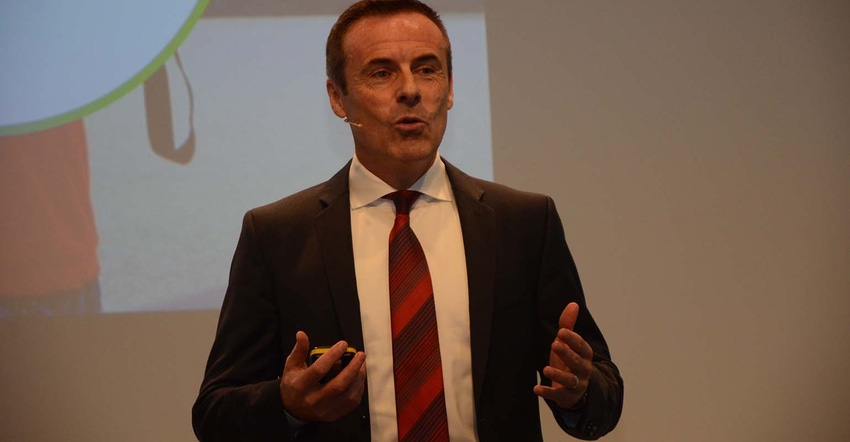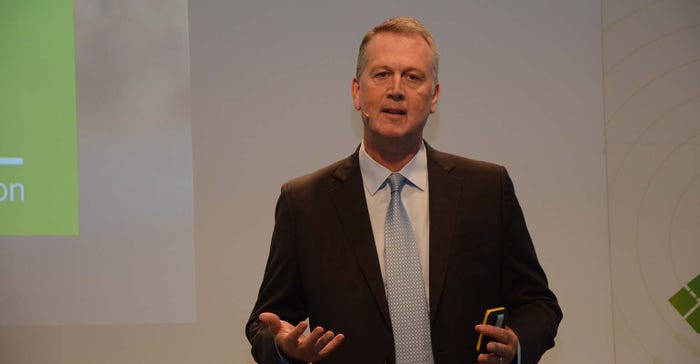
Early 2018 is the intended closing date of the transaction between Bayer and Monsanto, according to the latest update from Liam Condon, Bayer Management Board member and President of Bayer's Crop Science Division. That's when the European Commission will likely give its final decision on Bayer's proposed $66 billion acquisition of Monsanto.
At the Future of Farming Dialogue hosted by Bayer Crop Science this week in Germany, Condon noted that on Monday, Bayer filed an application to the European Commission to extend the review deadline by 10 working days until Jan. 22, 2018, with the goal of facilitating an appropriate evaluation given the size of the transaction.
While there isn't much overlap between the two companies in terms of seed and crop protection sales, Condon said areas that do overlap are under discussion amongst regulators regarding which assets would be necessary divestments to move forward with the acquisition.
Condon said Bayer is willing to divest up to $1.6 billion in sales in order to proceed with the proposed acquisition. Bayer has previously said it is willing sell its Liberty herbicide and LibertyLink trait portfolios as a possible divestiture to satisfy antitrust regulators.
However, who would purchase the assets isn't yet known.
"We are in discussion with multiple interested parties who are highly interested in acquiring these assets, either in total or parts of the solution, parts of the overall package," Condon said. "Regulators will also want to have a look at who the potential acquirer is in the future. They will want to look at it from the background of the other company – are they strong enough to ensure competition in the future?"
Plans for the future
Condon also discussed plans for the future and what the two combined companies might look like – including three strategic targets to help shape the company's goals – bringing new innovations to producers; making a complete commitment to sustainability; and maintaining societal responsibility.
"We believe and our investors are hoping this is going to be a financially successful company," Condon added. "But it's also a company that's going to do good. That's why as we develop the future strategy of the company we're also linking it to UN's Sustainable Development Goals."
Condon later added that with the combined companies' complementary benefits, he has high hopes for the combined companies to bring new innovation to the table – including potential novel chemistries and innovations in the precision ag arena.
Part of Bayer's commitment to innovation and sustainability is in its Digital Farming platform, which Bayer has announced it will invest at least €200 million toward between 2015 and 2020.
The Crop Science division has invested around €1 billion annually in R&D, and is committed to bringing 15 active ingredients and traits or trait combinations to the market between 2017 and 2020.
This commitment to innovation and sustainability may involve working with outside companies and organizations, said Adrian Percy, Global Head of Research and Development for Bayer Crop Science.
"What we can't afford ourselves is to have a 'not invented here syndrome,' and only look to technology areas we're comfortable with that we have traditionally developed as a company," Percy said. "We have to look to the outside world. We have to look at capturing and harnessing that innovation that's going on beyond our doors."
For example, in August, Bayer and Rothamsted Research signed an agreement to develop customized agronomic solutions for the individual grower.
Most recently, Bayer and Ginkgo Bioworks entered into an agreement to create a new company focused on the plant microbiome with an initial focus on nitrogen fixation.

OUTSIDE THE BOX: Adrian Percy, Global Head of Research and Development for Bayer Crop Science, noted Bayer's commitment to innovation and sustainability will likely involve collaborating with outside companies, organizations and universities.
Aiming for transparency
According to a recent global survey Bayer fielded with 10,000 people in 10 countries, over 9 out of 10 people believe ensuring a safe, affordable and nutritious food supply through innovation is an urgent issue. However, many consumers remain emotionally skeptical about trusting science and research, and one of the biggest ongoing challenges is meeting societal expectations.
One way to build trust and understanding of innovation is through transparency, and Percy said one of Bayer's latest initiatives is to openly share proprietary safety data – including data used to make decisions on whether or not to move a product forward in the pipeline, and standards used by regulators in evaluating product for granting registration.
"The European Court of Justice last year indicated they wanted more transparency. What we want to do is build on that and take it a step further. What we've decided to do is build a website where we will post summaries on all of the safety data that has been generated on our products," Percy said. "We will of course not compromise some of the proprietary data we have which is not safety-related or how products are manufactured, but I think it's really important that we take this step."
"All these technologies are fantastic, but if we don't have societal or regulatory acceptance, all that we're doing, all the company is doing is really for nothing," Percy said. "That's why it's so important if we want to bring new innovation to agriculture, that we also think the piece around the exchange of dialogue, not just with regulatory authorities but with the public, with stakeholders, with farmers around the world."
About the Author(s)
You May Also Like






